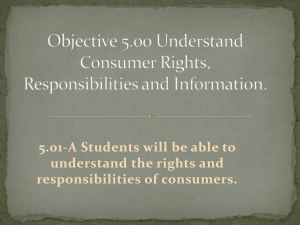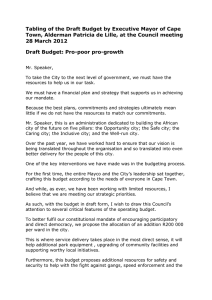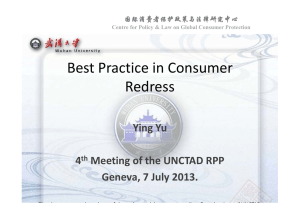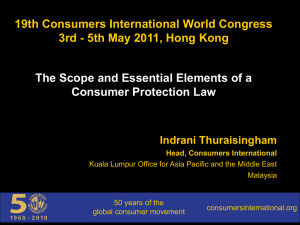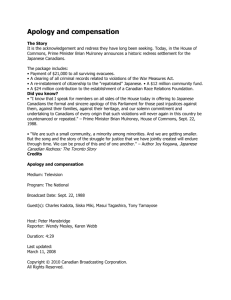Speech by Executive Mayor Alderman Patricia de Lille at
advertisement
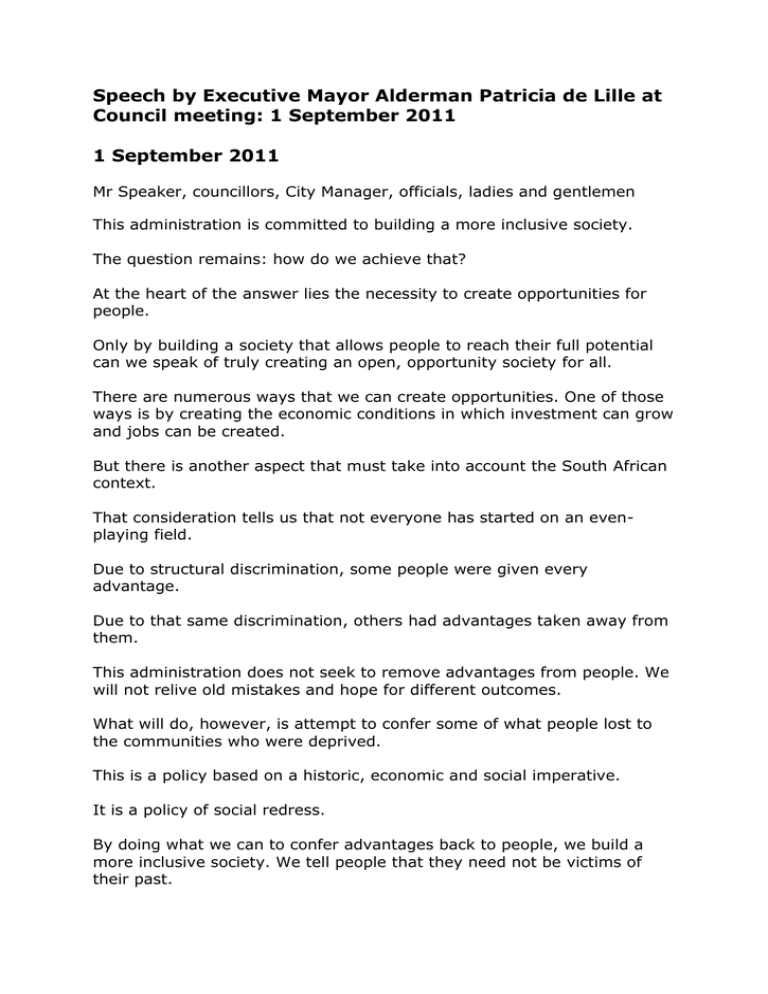
Speech by Executive Mayor Alderman Patricia de Lille at Council meeting: 1 September 2011 1 September 2011 Mr Speaker, councillors, City Manager, officials, ladies and gentlemen This administration is committed to building a more inclusive society. The question remains: how do we achieve that? At the heart of the answer lies the necessity to create opportunities for people. Only by building a society that allows people to reach their full potential can we speak of truly creating an open, opportunity society for all. There are numerous ways that we can create opportunities. One of those ways is by creating the economic conditions in which investment can grow and jobs can be created. But there is another aspect that must take into account the South African context. That consideration tells us that not everyone has started on an evenplaying field. Due to structural discrimination, some people were given every advantage. Due to that same discrimination, others had advantages taken away from them. This administration does not seek to remove advantages from people. We will not relive old mistakes and hope for different outcomes. What will do, however, is attempt to confer some of what people lost to the communities who were deprived. This is a policy based on a historic, economic and social imperative. It is a policy of social redress. By doing what we can to confer advantages back to people, we build a more inclusive society. We tell people that they need not be victims of their past. We tell people that this whole society will move forward together. We tell people that no one will be left behind. Mr. Speaker, I am pleased to say that the first project of this administration’s desire for redress is before this Council today. Emerging from the Mayco, we have recommended the sale of Councilowned property in Claremont for the purposes of restitution as a land claim. If approved, this sale will settle 60 Claremont land restitution claims. This project has been in the system for some years. However, to reach this point, we have accepted an evaluation for the property at R27 million. This is below our own City evaluations that have placed the value at over R40 million. However, the Regional Land Claims Commissioner claimed that it could not meet our assessment. We have accepted the commissioner’s price and I recommend the sale. We must always abide by the Municipal Finance Management Act (MFMA), which enjoins us to sell Council assets at market value. Implicit in that concept is the principle that the price can be accepted by a willing and informed seller who is willing to accept what a willing and informed buyer is willing to pay. Mr. Speaker, what informs our recommendation to this Council is the constitutional imperative for local government to be the leader of economic and social development. It is the constitutional imperative for redress, especially through land restitution. We know that this process has stalled nationally and that people’s sense of justice has waited in the balance. If the Council approves this measure today, we show the synergy of constitutional imperatives. We will show that local governments through their legal mandates can be the agents of constitutional imperatives. We can be at the forefront of redress and show the people of this city, and the country, that we need not wait for long processes to achieve redress. We can build inclusive societies if governments can be motivated enough to act when they have the chance to. Mr. Speaker, we must also remember that redress and inclusivity extend to more than settling economic claims. Though that achieves justice and complements long-term sustainable development, we must also transform the spaces in which we live. We have already taken the first step, having honoured former president Nelson Mandela by naming a road after him. Let us take this process forward. By the end of the year, the plaza between the Civic Centre and the Artscape will be renamed Albert Luthuli Place to mark the 50th anniversary of his Nobel Peace Prize. Oswald Pirow Street will be renamed Christiaan Barnard Street on the 10th anniversary of his death in December. And design options for Krotoa in the CBD are in hand. Going forward, we will call for nominations to the Advisory Committee prescribed by our Naming Policy. Those citizens selected will be asked to assess public submissions finding names for the six footbridges that span Nelson Mandela Boulevard. They will also assess future names changes and indeed, new streets and places that require new names. In that regard, at the Council next month, in accordance with the policy, it will be proposed by motion to rename Western Boulevard after another great icon in our struggle for democracy, Helen Suzman. To build inclusivity, we must consider that redress is also a full consideration of ourselves as many communities living together as one people. We must recognize the history of those communities and we will endeavour to do so. But we must also begin forging a heritage that recognises a common heritage and a shared path to a society based on dignity. Mr. Speaker, those spatial changes need not be only symbolic. We can change the imagery of this city and what it represents. But in changing the way people think of our shared space, we can also change the way people use it. Inclusion means linking people spatially as well. It means connecting the people of this city to each other and to opportunities. It means building a public transport network for everyone. We have already achieved a great deal with the IRT. Today, I am pleased to announce that the City of Cape Town is planning several MyCiti bus services, including and express service, between Mitchells Plain, Khayelitsha and the CBD. This express service will be rolled-out by December 2013. In addition, new services are also planned for transport corridors between the Metro South-East and the southern, northern and west coast suburbs, where passenger demands are high but a rail service does not exist. In essence, this express service will provide new avenues of opportunity for our people who have been let down by the lack of capacity in passenger rail services. We will continue our engagements with those rail services to improve those conditions. In the meantime, we will do all that we can to provide infrastructure to those who need it most. Redress must also be innovative. It must seek new, dynamic ways to defeat toxic legacies, especially in the spatial environment. We will translate greater social redress into this project providing infrastructure to those parts of the city that have been historically neglected. We will also seek, as a broader project of redress, through inclusive policies that provide opportunity, to create growth and economic development in struggling areas. Mr. Speaker, it is well known that Atlantis has been especially hard hit in these tough economic times. The changes in world markets, coupled with changes in economic drivers in South Africa and a lack of connections, has left the area in a particularly vulnerable state. We would seek to aid investment in the area. Mayco has recommended that we support the proposed process for the establishment of a Green Technology Manufacturing Cluster on land owned by the City in the Atlantis Industrial area. The National Department of Energy has recently approved power purchase agreements that will lead to the establishment of a number of renewable energy power plants and related manufacturing facilities in the country. Investors in this sector will soon be deciding where to put their money to build up these new industries. Mr. Speaker, this Council has the opportunity to support a Green Technology Manufacturing Cluster in Atlantis through innovative and fast approaches to leasing and disposing of municipal land to aid these industries. Such measures would do a great deal for attracting green technology to Cape Town, positioning us well for a new competitive advantage in energy production. Moreover, it would provide investment in Atlantis of the kind not seen for some time. It would increase the scope for economic opportunities in this city. In so doing, it would include people who have felt like they have been on the periphery of our society. It would be redress through expansive economic policy at work. Mr. Speaker, it is possible to have a city that is more inclusive. The city of opportunity is built today through initiatives that take stock of our past, our present and our future. It is built by taking all of society forward together. It is unfortunately undermined when individuals disrupt the mandate of this city with no clear goal in mind. I respect the right to strike. I fought for it. But I do not respect the wilful destruction of property and threats to innocent people. We all build this city together. It is not an easy task. Sometimes, we will disagree and people must have the space in which they voice their disagreements. But to engage as honest partners, we must always engage each other with integrity and respect. Because, in the end, we cannot speak of redress of the past for inclusivity in the future if we cannot speak to each other as dignified individuals in the here and now.
